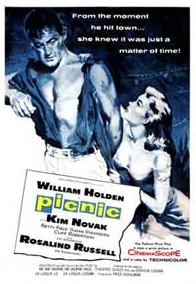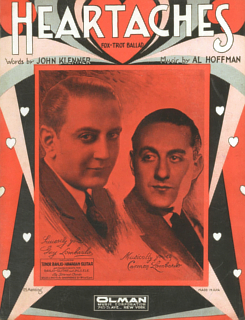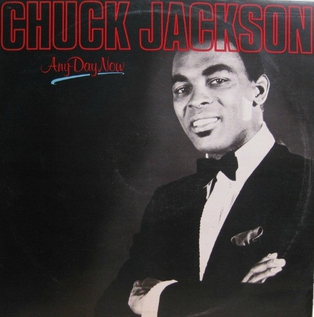
Picnic is a 1955 American Technicolor romantic comedy-drama film filmed in CinemaScope. It was adapted for the screen by Daniel Taradash from William Inge's 1953 Pulitzer Prize-winning play of the same name. Joshua Logan, director of the original Broadway stage production, directed the film version, which stars William Holden, Kim Novak, and Rosalind Russell, with Susan Strasberg and Cliff Robertson in supporting roles. Picnic was nominated for six Academy Awards, including Best Picture, and won two.
"Hey There" is a show tune from the musical play The Pajama Game, written by Richard Adler and Jerry Ross. It was published in 1954. It was introduced by John Raitt in the original production. In the show, Sid sings it to a recording device, telling himself that he's foolish to continue his advances to Babe. He plays the tape back, and after responding to his own comments, sings a duet with himself.
"Why Don't You Believe Me?" is a popular song written by Lew Douglas, King Laney, and Roy Rodde and published in 1952.
"Sincerely" is a popular song written by Harvey Fuqua and Alan Freed and first released by The Moonglows in 1954.

"Heartaches" is a song written by composer Al Hoffman and singer John Klenner and originally published in 1931. A fast-tempo instrumental version of the song by Ted Weems and his Orchestra became a major hit in 1947, topping the Billboard Best Selling Singles chart. Later versions by band leader Harry James and doo-wop group the Marcels were also chart successes. "Heartaches" received renewed attention in the 2010s after several 1930s recordings of the song, including a version by Sid Phillips & his Melodians with Al Bowlly, were sampled in the Caretaker's album Everywhere at the End of Time.
"The Little White Cloud that Cried" is a popular song written by Johnnie Ray and published in 1951.

Morris W. Stoloff was a musical composer. Stoloff worked with Sammy Davis Jr., Dinah Shore, Al Jolson and Frank Sinatra.
"Moonglow", also known as "Moonglow and Love" is a 1933 popular song. The music was by Will Hudson and Irving Mills and the words were by Eddie DeLange.

"Rock-a-Bye Your Baby with a Dixie Melody" is a popular song written by Jean Schwartz, with lyrics by Sam M. Lewis and Joe Young. The song was introduced by Al Jolson in the Broadway musical Sinbad and published in 1918.
"Everything I Have Is Yours" is a popular song. The music was written by Burton Lane, the lyrics by Harold Adamson. The song was published in 1933. It was first sung by Art Jarrett in the 1933 film Dancing Lady.
"Theme from Picnic" is a popular song, originated in the 1955 movie Picnic, starring Kim Novak and William Holden, which was based on the play of the same name. The song is often referred to simply as "Picnic."
"Little Latin Lupe Lu" was written by Bill Medley in 1962, and became the song that launched The Righteous Brothers' career. Though it peaked on the Billboard Hot 100 at number 49 on June 8, 1963, Medley and his partner, Bobby Hatfield, were offered a national distribution contract by VeeJay records. It was purchased the following year by Phil Spector, who went on to produce their most successful recordings. The song has been covered by more than twenty artists, notably by Bruce Springsteen, from 1977-2009.

"One Less Bell to Answer" is a song written by Burt Bacharach and Hal David. Originally written in 1967 for Keely Smith, the song was rediscovered in late 1969 by Bones Howe, the producer for the 5th Dimension, and the song was included on the group's 1970 debut album for Bell Records, Portrait. Lead vocals on the single were sung by Marilyn McCoo.

"Any Day Now" is a popular song written by Burt Bacharach and Bob Hilliard in 1962. It has been recorded by numerous artists over the years, including notable versions by Chuck Jackson in 1962, Alan Price in 1965, Elvis Presley in 1969, Scott Walker in 1973 and Ronnie Milsap in 1982. In the lyrics, the singer predicts the imminent demise of a romantic relationship and describes the sadness this will leave.
"Flamingo" (1940) is a popular song and jazz standard written by Ted Grouya with lyrics by Edmund Anderson and first recorded by singer Herb Jeffries and the Duke Ellington Orchestra on December 28, 1940, for Victor Records. This briefly reached the Billboard charts in 1941.

"Almost Grown" is a song written and recorded by Chuck Berry. It was released as a double A-side with "Little Queenie".
"Reach Out for Me" is a 1963 a song written by Burt Bacharach and Hal David and originally recorded by Lou Johnson. In the US, the original version peaked at number seventy-four on the Billboard Hot 100 the week ending December 7, 1963.

Raindrops Keep Fallin' on My Head is the twenty-fifth studio album by American pop singer Andy Williams and was released in the spring of 1970 by Columbia Records. Williams was less focused on covering recent hits on this project and instead selected several songs from the singer-songwriter genre. The concept for the album came from Mason Williams, who contacted producer Dick Glasser about co-producing an album that would give Williams's fans a medley of songs that did more than just highlight the most familiar parts of popular songs but rather focus on a unifying theme or storyline of songs that were not necessarily hit records. Billboard magazine opined that the album "may well be titled 'A Journey Through Life.' Through carefully selected songs it conveys a message of dreams, hopes, reality, frustrations and ultimate truth."

Unforgettable – A Musical Tribute to Nat King Cole is a soundtrack album released in the UK in 1983 by the CBS Records division of Columbia in conjunction with the broadcast of American pop singer Johnny Mathis's BBC television concert special of the same name that featured Cole's daughter Natalie. The front of the original album jacket credits the concert performers as "Johnny Mathis and Natalie Cole", whereas the CD booklet reads, "Johnny Mathis with special guest Natalie Cole".

"I Believe in Love" is the debut solo single by American musician Kenny Loggins. It was written by Loggins with lyrics by Alan and Marilyn Bergman. The song was introduced by Barbra Streisand in the 1976 film A Star Is Born, and appears on its soundtrack album. It was released in November 1976 as the B-side to the album's first single, "Evergreen ".









